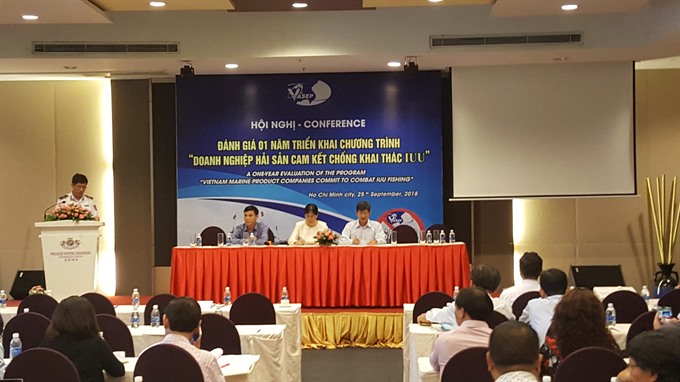 Economy
Economy

Việt Nam’s seafood industry hopes to get a “green card” from the European Commission soon after succeeding in its efforts to fight illegal, unreported and unregulated fishing, but fishermen’s attitudes need to be addressed, a conference heard in HCM City yesterday.
 |
HCM CITY — Việt Nam’s seafood industry hopes to get a “green card” from the European Commission soon after succeeding in its efforts to fight illegal, unreported and unregulated fishing, but fishermen’s attitudes need to be addressed, a conference heard in HCM City yesterday.
“Việt Nam got the EC’s yellow card last year after the country failed to demonstrate sufficient progress in the fight against IUU fishing,” Nguyễn Thị Thu Sắc, chairwoman of the Việt Nam Association Seafood Exporters and Producers (VASEP)’s marine product committee, told the ‘One-year evaluation of the programme: Việt Nam marine product companies commit to combat IUU fishing’.
Việt Nam might meet the requirements this year but this could cause fisherman to take the issue lightly, she warned.
Since late last year the Government had addressed a huge number of issues to mitigate the situation, she said.
"The most important task now is to change fishing to make it sustainable and responsible," she added.
VASEP’s worry about fisherman’s attitudes is justified because management of fishing at the province and city levels remains lax.
Việt Nam has a long tradition of having thousands of fishing boats, most of them small, making it unwieldy to manage for authorities.
“Related authorities should focus on improving oversight of fishing and installing GPS equipment on boats,” Sắc said.
According to VASEP, Vietnamese seafood exports have been severely hit by the EC’s yellow card.
The EU accounts for 12 -15 per cent of the country’s seafood exports, and in the first eight months of this year shipments have plummeted by 25 per cent year-on-year to US$252 million.
“Seafood exports to the EU will continue to decrease this year and this year’s turnover will be lower than expected at around US$3.2 billion,” Lê Hằng, deputy director of VASEP Pro Centre, said.
The yellow card is a warning measure given to nations considered at risk of being deemed unco-operative in the fight against IUU fishing.
Though the EU’s trade policy itself does not change with a yellow card, it has badly affected the reputation of Vietnamese seafood world-wide, hitting sales.
Exports from yellow card countries are subjected to intense scrutiny, and all Vietnamese fish export containers have been inspected since it received the card.
The yellow card, announced in October 2017, identified shortcomings in Việt Nam’s efforts to fight illegal fishing, including the lack of an effective sanctioning system to deter IUU fishing activities and a lack of action to address illegal fishing done by Vietnamese vessels in the waters of neighbouring countries, including Pacific Small Island Developing States.
According to the EC, between 11 and 26 million tonnes of fish, or at least 15 per cent of the world catch, are caught illegally each year, a figure worth between 8-19 billion euros.
As the world’s largest fish importer, the European Union’s import regulations wield global influence.
To address IUU fishing activities, the EC evaluates exporting countries.
Countries that fail to meet its standards are issued a warning (yellow card) followed by a green card if issues are resolved or a red card if they are not.
A red card can lead to a ban on fisheries products from a country. — VNS